Unit1知识点全沪教版英语七年级上册
- 格式:pdf
- 大小:25.25 KB
- 文档页数:5
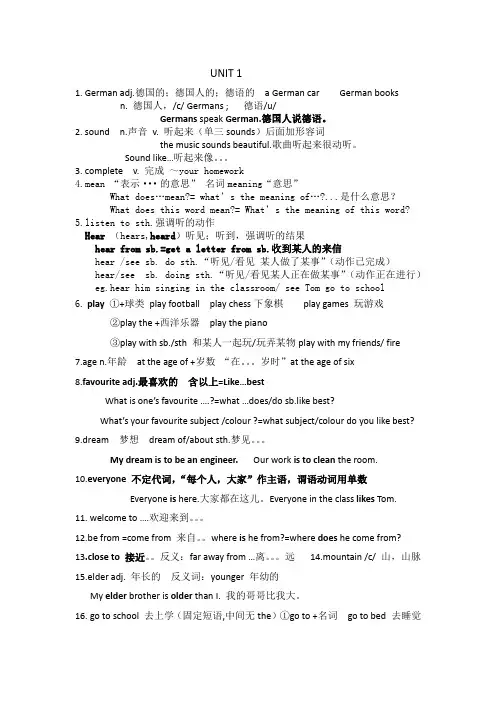
UNIT 11. German adj.德国的;德国人的;德语的 a German car German booksn. 德国人,/c/ Germans ; 德语/u/Germans speak German.德国人说德语。
2. sound n.声音v. 听起来(单三sounds)后面加形容词the music sounds beautiful.歌曲听起来很动听。
Sound like…听起来像。
3. complete v. 完成~your homework4.mean “表示···的意思”名词meaning“意思”What does…mean?= what’s the meaning of…?...是什么意思?What does this word mean?= What’s the meaning of this word? 5.listen to sth.强调听的动作Hear(hears,heard)听见;听到,强调听的结果hear from sb.=get a letter from sb.收到某人的来信hear /see sb. do sth.“听见/看见某人做了某事”(动作已完成)hear/see sb. doing sth.“听见/看见某人正在做某事”(动作正在进行)eg.hear him singing in the classroom/ see Tom go to school6. play ①+球类play football play chess下象棋play games 玩游戏②play the +西洋乐器play the piano③play with sb./sth 和某人一起玩/玩弄某物play with my friends/ fire7.age n.年龄at the age of +岁数“在。
岁时”at the age of six8.favourite adj.最喜欢的含以上=Like…bestWhat is one’s favourite ….?=what …does/do sb.like best?What’s your favourite subject /colour ?=what subject/colour do you like best?9.dream 梦想dream of/about sth.梦见。
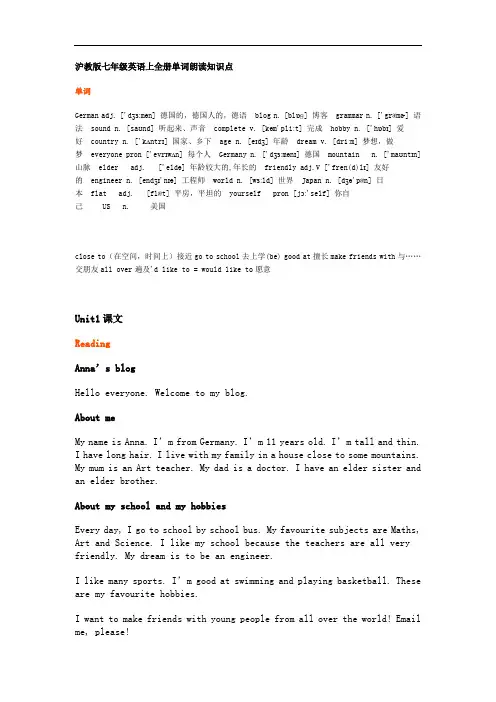
沪教版七年级英语上全册单词朗读知识点单词German adj. ['dʒɜːmən] 德国的,德国人的,德语blog n. [blɒɡ] 博客grammar n. ['græmɚ] 语法sound n. [saʊnd] 听起来、声音complete v. [kəm'pliːt] 完成hobby n. ['hɒbɪ] 爱好country n. ['kʌntrɪ] 国家、乡下age n. [eɪdʒ] 年龄dream v. [driːm] 梦想,做梦everyone pron ['evrɪwʌn] 每个人Germany n. ['dʒɜːmənɪ] 德国mountain n. ['maʊntɪn] 山脉elder adj. ['eldə] 年龄较大的,年长的friendly adj.V ['fren(d)lɪ] 友好的engineer n. [endʒɪ'nɪə] 工程师world n. [wɜːld] 世界Japan n. [dʒə'pæn] 日本flat adj. [flæt] 平房,平坦的yourself pron [jɔː'self] 你自己US n. 美国close to(在空间,时间上)接近go to school去上学(be) good at擅长make friends with与……交朋友all over遍及'd like to = would like to愿意Unit1课文ReadingAnna’s blogHello everyone. Welcome to my blog.About meMy name is Anna. I’m from Germany. I’m 11 years old. I’m tall and thin.I have long hair. I live with my family in a house close to some mountains. My mum is an Art teacher. My dad is a doctor. I have an elder sister and an elder brother.About my school and my hobbiesEvery day, I go to school by school bus. My favourite subjects are Maths, Art and Science. I like my school because the teachers are all very friendly. My dream is to be an engineer.I like many sports. I’m good at swimming and playing basketball. These are my favourite hobbies.I want to make friends with young people from all over the world! Email me, please!安娜的博客大家好。
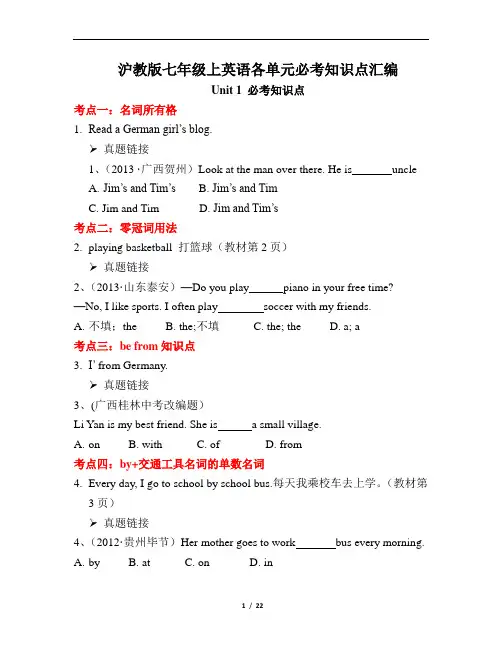
沪教版七年级上英语各单元必考知识点汇编Unit 1 必考知识点考点一:名词所有格1.Read a German girl’s blog.➢真题链接1、(2013 ·广西贺州)Look at the man over there. He is uncleA.Jim’s and Tim’sB. Jim’s and TimC. Jim and TimD. Jim and Tim’s考点二:零冠词用法2.playing basketball 打篮球(教材第2页)➢真题链接2、(2013·山东泰安)—Do you play piano in your free time? —No, I like sports. I often play soccer with my friends.A.不填;theB. the;不填C. the; theD. a; a考点三:be from知识点3.I’ from Germany.➢真题链接3、(广西桂林中考改编题)Li Yan is my best friend. She is a small village.A.onB. withC. ofD. from考点四:by+交通工具名词的单数名词4.Every day, I go to school by school bus.每天我乘校车去上学。
(教材第3页)➢真题链接4、(2012·贵州毕节)Her mother goes to work bus every morning.A.byB. atC. onD. in考点五:知识点5.Her hobbies 她的爱好(教材第2页)➢真题链接5、(2013 江苏盐城中考)—Do you have any ?—Yes, I like chess and drama best.A. jobsB. dutiesC. hobbiesD. problems考点六:知识点6、I like my school because the teachers are all very friendly.(教材第3页) 真题链接6、(2013 湖北襄阳)—How are you getting along with your new classmates?—Very well. They are all me.A.afraid ofB. friendly toC. angry withD. sorry for考点七:知识点7.I’m good at swimming and playing basketball.(教材第3页)➢真题链接7、(2012 山东临沂)English is my favorite subject, and I am good it.A.forB.toC.atD.ofUnit 1 必考知识点答案解析1、【答案】D【解析】:根据上句Look at the man over there. “看那边那个男人“可知,男人只有一个,由此可以推断这个男人是两人共同的叔叔、Jim’s and Tim’s “吉姆和蒂姆各自的叔叔”。
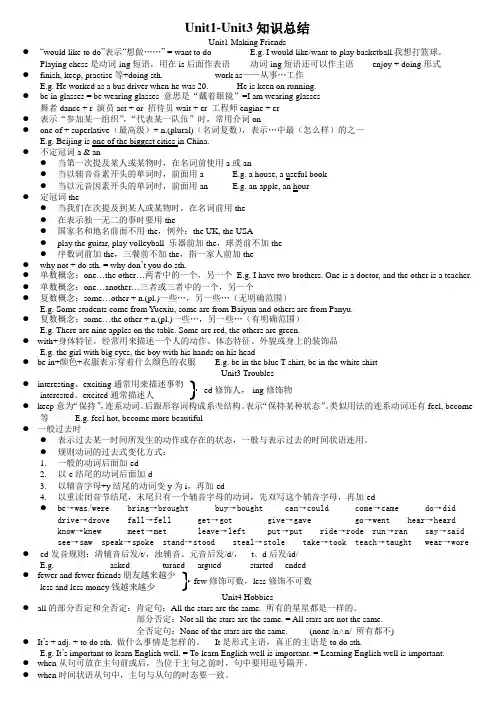
Unit1-Unit3知识总结Unit1 Making Friends ●“would like to do ”表示“想做……” = want to do E.g. I would like/want to play basketball.我想打篮球。
Playing chess 是动词-ing 短语,用在is 后面作表语 动词-ing 短语还可以作主语 enjoy + doing 形式 ●finish, keep, practise 等+doing sth. work as ——从事…工作 E.g. He worked as a bus driver when he was 20. He is keen on running. ●be in glasses = be wearing glasses 意思是“戴着眼镜”=I am wearing glasses 舞者dance + r 演员act + or 招待员wait + er 工程师engine + er ●表示“参加某一组织”,“代表某一队伍”时,常用介词on ●one of + superlative (最高级)+ n.(plural)(名词复数),表示…中最(怎么样)的之一 E.g. Beijing is one of the biggest cities in China. ● 不定冠词● 当第一次提及某人或某物时,在名词前使用a 或an● 当以辅音音素开头的单词时,前面用a E.g. a house, a useful book● 当以元音因素开头的单词时,前面用an E.g. an apple, an hour● 定冠词the● 当我们在次提及到某人或某物时,在名词前用the● 在表示独一无二的事时要用the● 国家名和地名前面不用the ,例外:the UK, the USA● play the guitar, play volleyball 乐器前加the ,球类前不加the● 序数词前加the ,三餐前不加the ,指一家人前加the● why not + do sth. = why don ’t you do sth.● 单数概念:one …the other …两者中的一个,另一个 E.g. I have two brothers. One is a doctor, and the other is a teacher. ● 单数概念:one …another …三者或三者中的一个,另一个● 复数概念:some …other + n.(pl.)一些…,另一些…(无明确范围)E.g. Some students come from Yuexiu, some are from Baiyun and others are from Panyu.● 复数概念:some …the other + n.(pl.)一些…,另一些…(有明确范围)E.g. There are nine apples on the table. Some are red, the others are green.● with+身体特征,经常用来描述一个人的动作、体态特征、外貌或身上的装饰品E.g. the girl with big eyes, the boy with his hands on his head● be in+颜色+衣服表示穿着什么颜色的衣服 E.g. be in the blue T-shirt, be in the white shirtUnit3 Troubles● interesting 、exciting 通常用来描述事物 interested 、excited 通常描述人● keep 意为“保持”,连系动词。
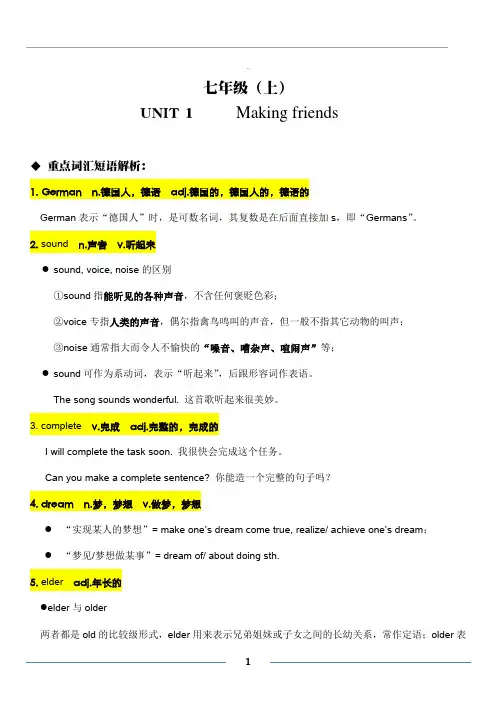
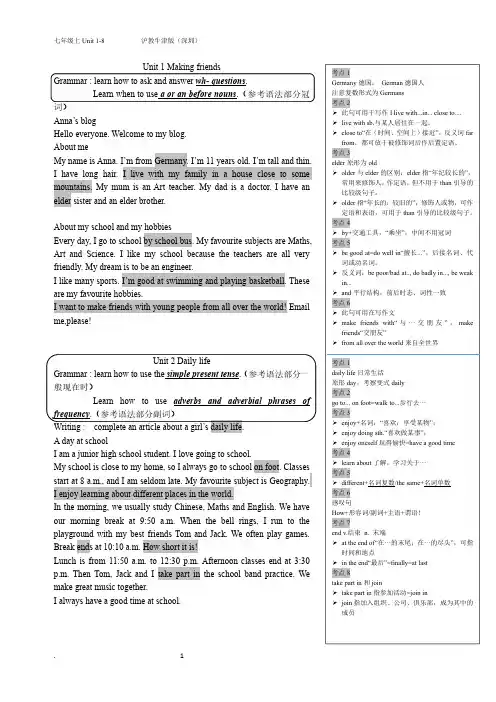
Anna’s blogHello everyone.Welcome to my blog.About meMy name is Anna.I’m from Germany.I’m 11years old.I’m tall and thin.I have long hair.I live with my family in a house close to some mountains.My mum is an Art teacher.My dad is a doctor.I have an elder sister and an elder brother.About my school and my hobbiesEvery day,I go to school by school bus.My favourite subjects are Maths,Art and Science.I like my school because the teachers are all very friendly.My dream is to be an engineer.I like many sports.I’m good at swimming and playing basketball.These are my favourite hobbies.I want to make friends with young people from all over the world!Email me,please!I am a junior high school student.I love going to school.My school is close to my home,so I always go to school on foot.Classes start at 8a.m.,and I am seldom late.My favourite subject is Geography.I enjoy learning about different places in the world.In the morning,we usually study Chinese,Maths and English.We have our morning break at 9:50a.m.When the bell rings,I run to the playground with my best friends Tom and Jack.We often play games.Break ends at 10:10a.m.How short it is!Lunch is from 11:50a.m.to 12:30p.m.Afternoon classes end at 3:30p.m.Then Tom,Jack and I take part in the school band practice.We make great music together.I always have a good time at school.and fields.Some places are very hot,and some are very cold.There are many different plants.Some are large.Some are small.All plants need light and water.There are different animals on Earth too.Some live on the land.Some fly in the sky.Some live under the water.There are also many people like you and me on Earth.The Earth provides us with air,water and food.It is our home.Today,there is a lot of pollution.We burn things to make energy.This pollutes the air.We put our rubbish into the sea and under the ground.This pollutes the Earth and kills animals and plants.We must stop doing these things.It is important for us to protect the Earth for our future.SpringIn spring,the weather starts to get warm.The wind blows gently.It often rains.Plants start to grow.Everything turns green.It is exciting to take a trip in spring.SummerThe weather is hot in summer.The sun shines brightly.Many people like to go to the beach and swim in the sea.It is nice to eat ice cream in the hot weather.AutumnIn autumn,everything changes.Leaves turn brown,red or yellow and start falling from the trees.It is nice to go on a picnic at this time of year because the weather is cool and dry.WinterWinter is often cold and snowy.Children love winter because they love to play in the snow.It is interesting to make snowmen.People usually spend time with their relatives during the Spring Festival.考点1The Earth 独一无二,要用冠词on earth 世界上on the earth 在地球上考点2此句可用于环境类写作provide sb.with sth.=provide sth.for sb.“为某人提供某物”The sun provides us with heat and light.=The sun provides heat and light for us.考点3pollution “污染”,不可数名词 pollute “污染”,动词 polluted “受污染的”,形容词/过去分词考点4put...into “把···倒入···;将···注入···”拓展:put up 提出、张贴;put off 推迟;put away 把···收起来;put down 放下,写下;put on 穿上,增加(体重);put out 扑灭,熄灭考点5stop doing sth.停止做某事stop to do sth.停下来去做另一件事考点6此句可用在写作文It is +adj.for sb.to do sth.“对于某人来说,做某事是...的”注:当形容词表示人物性格、特点时,for 要变为of 。
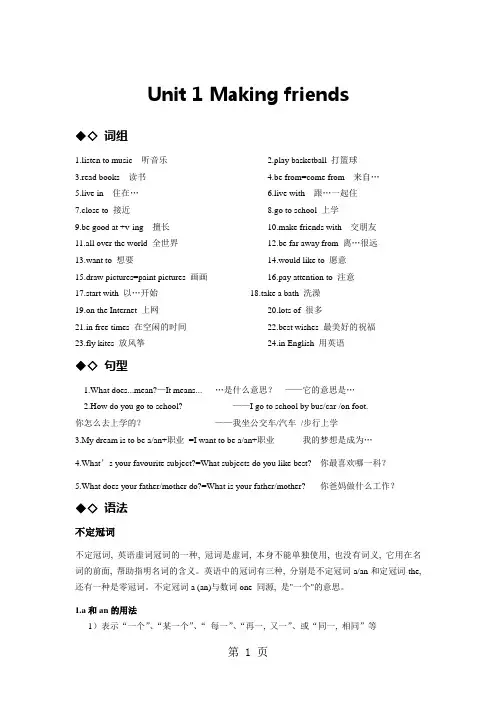
Unit 1 Making friends◆◇ 词组1.listen to music 听音乐2.play basketball 打篮球3.read books 读书4.be from=come from 来自…5.live in 住在…6.live with 跟…一起住7.close to 接近8.go to school 上学9.be good at +v-ing 擅长10.make friends with 交朋友11.all over the world 全世界12.be far away from 离…很远13.want to 想要14.would like to 愿意15.draw pictures=paint pictures 画画16.pay attention to 注意17.start with 以…开始18.take a bath 洗澡19.on the Internet 上网20.lots of 很多21.in free times 在空闲的时间22.best wishes 最美好的祝福23.fly kites 放风筝24.in English 用英语◆◇句型1.What does...mean?—It means... …是什么意思?——它的意思是…2.How do you go to school? ——I go to school by bus/car /on foot.你怎么去上学的?——我坐公交车/汽车/步行上学3.My dream is to be a/an+职业=I want to be a/an+职业我的梦想是成为…4.What’s your favourite subject?=What subjects do you like best? 你最喜欢哪一科?5.What does your father/mother do?=What is your father/mother? 你爸妈做什么工作?◆◇语法不定冠词不定冠词, 英语虚词冠词的一种, 冠词是虚词, 本身不能单独使用, 也没有词义, 它用在名词的前面, 帮助指明名词的含义。
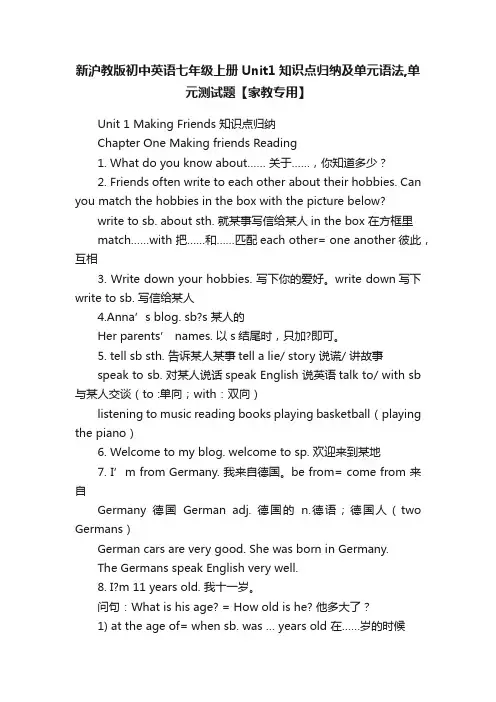
新沪教版初中英语七年级上册Unit1知识点归纳及单元语法,单元测试题【家教专用】Unit 1 Making Friends 知识点归纳Chapter One Making friends Reading1. What do you know about…… 关于……,你知道多少?2. Friends often write to each other about their hobbies. Can you match the hobbies in the box with the picture below?write to sb. about sth. 就某事写信给某人in the box 在方框里match……with 把……和……匹配each other= one another彼此,互相3. Write down your hobbies. 写下你的爱好。
write down写下write to sb. 写信给某人4.Anna’s bl og. sb?s 某人的Her parents’ names. 以s结尾时,只加?即可。
5. tell sb sth. 告诉某人某事tell a lie/ story 说谎/ 讲故事speak to sb. 对某人说话speak English 说英语talk to/ with sb 与某人交谈(to :单向;with:双向)listening to music reading books playing basketball(playing the piano)6. Welcome to my blog. welcome to sp. 欢迎来到某地7. I’m from Germany. 我来自德国。
be from= come from 来自Germany 德国German adj. 德国的n.德语;德国人(two Germans)German cars are very good. She was born in Germany.The Germans speak English very well.8. I?m 11 years old. 我十一岁。
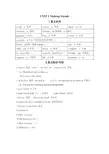
III详细讲解1.Read a German girl’s blog。
(1)German :① adj.德国的(德国人的,德语的)This is a German car。
② n.德国人,是可数名词。
复数形式要在后面加“s”。
德语,是不可数名词。
e.g.: Germans speak German。
◎中国China,中国人/中文Chinese;日本Japan,日本人/日语Japanese;法国France,法国人/法语French;英国England/Britain/U.K. 英国人/英语English(2)girl’s是名词“girl”的所有格形式,意为“女孩的···”所有格:在名词后加上“’s”构成所有格,表示一种所属关系,表示“···的”它的构成有以下方式:①一般情况下在名词词尾加“’s” e.g.: Tom’s books 汤姆的书②以-s结尾的复数名词的所有格,一般在其后面直接加“’”即可。
e.g.: parents’ names 父母的名字;Teachers’ Day 教师节③表示两人或多人各自的所属关系,要在各个词尾分别加“’s”;表示两人或多人共同的所属关系,只需要在最后一个词的词尾加“’s”。
e.g.: Lily’s and Linda’s bikes。
丽丽和琳达的自行车.(注意:两人各有一辆车)Lily and Linda’s room。
丽丽和琳达的房间。
(注意:两人共住一间房)④表示某人的家、店铺、办公室时,常省略“’s”后面的名词house,shop,office 等。
At my uncle’s = at my uncle’s home 在我叔叔家2.I’m from Germany. =I come from Germany.come from =be from 来自 e.g.: I’m from China.3.I have an elder sister and an elder brother.①Elder :形容词,“年长的”。
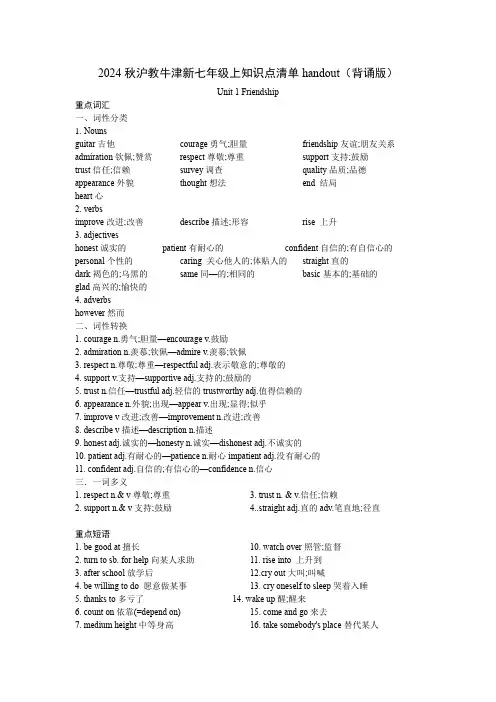
2024秋沪教牛津新七年级上知识点清单handout(背诵版)Unit 1 Friendship重点词汇一、词性分类1.Nounsguitar吉他courage勇气;胆量friendship友谊;朋友关系admiration钦佩;赞赏respect尊敬;尊重support支持;鼓励trust信任;信赖survey调查quality品质;品德appearance外貌thought想法end 结局heart心2. verbsimprove改进;改善describe描述;形容rise 上升3. adjectiveshonest诚实的patient有耐心的confident自信的;有自信心的personal个性的caring 关心他人的;体贴人的straight直的dark褐色的;乌黑的same同—的;相同的basic基本的;基础的glad高兴的;愉快的4. adverbshowever然而二、词性转换1. courage n.勇气;胆量—encourage v.鼓励2. admiration n.羡慕;钦佩—admire v.羡慕;钦佩3. respect n.尊敬;尊重—respectful adj.表示敬意的;尊敬的4. support v.支持—supportive adj.支持的;鼓励的5. trust n.信任—trustful adj.轻信的trustworthy adj.值得信赖的6. appearance n.外貌;出现—appear v.出现;显得;似乎7. improve v改进;改善—improvement n.改进;改善8. describe v描述—description n.描述9. honest adj.诚实的—honesty n.诚实—dishonest adj.不诚实的10. patient adj.有耐心的—patience n.耐心impatient adj.没有耐心的11. confident adj.自信的;有信心的—confidence n.信心三.一词多义1. respect n.& v尊敬;尊重 3. trust n. & v.信任;信赖2. support n.& v支持;鼓励 4..straight adj.直的adv.笔直地;径直重点短语1. be good at擅长10. watch over照管;监督2. turn to sb. for help向某人求助11. rise into 上升到3. after school放学后12.cry out大叫;叫喊4. be willing to do 愿意做某事13. cry oneself to sleep哭着入睡5. thanks to多亏了14. wake up醒;醒来6. count on依靠(=depend on)15. come and go来去7. medium height中等身高16. take somebody's place替代某人8. modern dance现代舞17. come along 出现9. take care of照顾(= look after / care for)核心句式1. What do you like doing?你喜欢做什么?2.Li Hua is helpful and patient.李华乐于助人且有耐心。
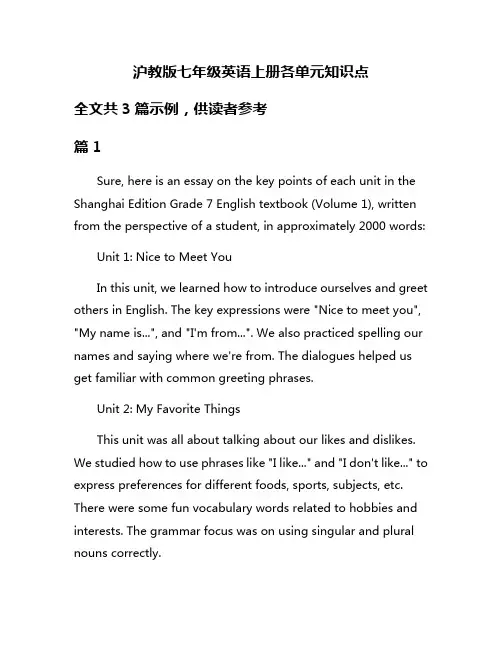
沪教版七年级英语上册各单元知识点全文共3篇示例,供读者参考篇1Sure, here is an essay on the key points of each unit in the Shanghai Edition Grade 7 English textbook (Volume 1), written from the perspective of a student, in approximately 2000 words:Unit 1: Nice to Meet YouIn this unit, we learned how to introduce ourselves and greet others in English. The key expressions were "Nice to meet you", "My name is...", and "I'm from...". We also practiced spelling our names and saying where we're from. The dialogues helped us get familiar with common greeting phrases.Unit 2: My Favorite ThingsThis unit was all about talking about our likes and dislikes. We studied how to use phrases like "I like..." and "I don't like..." to express preferences for different foods, sports, subjects, etc. There were some fun vocabulary words related to hobbies and interests. The grammar focus was on using singular and plural nouns correctly.Here we learned to describe our daily routines and schedules. The time expressions (e.g. in the morning, at night) and sequence words (first, then, after that) were really useful. We practiced asking "What time do you...?" and answering with sample schedules. Understanding adverbs of frequency was key for this unit.Unit 4: Looking GoodAppearance and clothing were the themes of this unit. By learning adjectives to describe how people look (tall, short, etc.) and words for different items of clothing, we could say things like "He's wearing a red shirt". We also learned how to use possessive adjectives correctly. The readings gave some interesting cultural perspectives on fashion.Unit 5: Activities and InterestsThis unit combined some of the language from previous units to allow us to talk more fully about our hobbies, free-time activities, and personal interests. The key grammar points included using the simple present tense for habits/routines and giving reasons with "because". We read about different extracurricular activities students can join.The dialogues and texts in this unit were all about celebrating special occasions and events like birthdays, holidays, etc. We studied vocabulary related to celebrations as well as phrases for giving good wishes ("Have a great day!", "Congratulations!"). Using prepositional phrases to indicate dates and times was practiced.Unit 7: Animal WorldAs you can guess, this unit introduced different animals and their characteristics. We learned words for describing animals' physical features, behaviors, habitats, etc. The grammar focused on proper use of demonstrative pronouns (this, that, these, those) as well as making comparisons using "as...as". The reading gave some insights into animal intelligence.Unit 8: Going PlacesThis unit equipped us with language for talking about travel, transportation, sights to see, and tourist activities. We studied different modes of transport and phrases you need when taking a trip ("check in", "book a hotel", etc.). The use of prepositions for indicating locations was highlighted. Reading a travel brochure was one of the tasks.Overall, this textbook has provided a solid foundation in conversational English centering on practical, real-life topics that middle school students can relate to. While building our vocabulary and grammatical knowledge, we've also gained insights into different cultures and perspectives through the readings. I feel much more confident using English to communicate about my daily experiences, interests, and future plans.篇2Unit 1: Hello, New TermIn this unit, we learned how to greet people and introduce ourselves in different situations. The key grammar points covered pronoun cases (I, me, you, etc.), the verb "to be" in different tenses, and question words like "what", "who", and "where". We also studied vocabulary related to school subjects, personal interests, and hobbies.Unit 2: The Same or DifferentThis unit focused on making comparisons using comparative and superlative adjectives. We learned how to form the comparative and superlative forms of one-syllable andmulti-syllable adjectives. The grammar section also includedusing "as...as" to show equality. New vocabulary revolved around describing people's personalities, appearances, and abilities.Unit 3: A Piece of AdviceHere, we explored the use of modal verbs like "should", "must", "have to" to give advice or make suggestions. The grammar covered forming negative and interrogative sentences with modals too. We read some interesting texts that gave advice on things like managing stress and dealing with peer pressure. New words were related to mental health, peer relationships, and social issues.Unit 4: A Brighter FutureIn this unit, we learned about expressing future plans and intentions using "will", "going to", and present continuous tense. The grammar section highlighted the different usages of these future forms. We studied vocabulary related to environmental protection, natural resources, and sustainability. The reading texts discussed ways to create a more eco-friendly future.Unit 5: In Memory of the PastThis unit introduced us to narrating past events using simple past tense. We covered the rules for regular and irregular verbs, as well as forming negative and interrogative sentences in simplepast. New vocabulary revolved around describing life experiences, family history, and cultural traditions. The texts gave insights into different cultures and customs.Unit 6: Telling StoriesHere we explored story telling techniques using past continuous tense and the contrast between past simple and past continuous. Grammar focused on forming the past continuous and using it to set the scene or describe ongoing actions. Vocabulary was related to narrating stories, describing scenes, using adverbs, and adding details.Unit 7: Living and TravelingIn this unit, we learned how to make comparisons using "as...as", "not as...as", "the same as", and other structures. The grammar also covered using quantifiers like "a few", "a little", "many", "much" etc. We expanded our travel vocabulary and read texts about different holiday destinations.Unit 8: Media and CommunicationsThis unit was all about talking about abilities using"can/can't", "could/couldn't" for past abilities, and modal verbs like "may/might" to express possibility. We studied vocabulary related to media, technology, and communication methods.Texts discussed the influence of media and social skills for the digital age.Throughout the textbook, we also learned lots of useful phrases and expressions to make our English sound more natural and fluent. Overall, this textbook helped improve our reading, writing, listening, and speaking abilities while introducing key grammar concepts.篇3Sure, here's an article about the key points covered in each unit of the Shanghai Education Edition Grade 7 English textbook (Volume 1), written from a student's perspective. The article is approximately 2,000 words long and is written in English.Title: Navigating the Shanghai Education Edition Grade 7 English Textbook (Volume 1)As a seventh-grader, the Shanghai Education Edition English textbook has been our trusty companion in our journey to mastering the English language. Each unit presents a unique set of challenges and opportunities for growth, and I'm excited to share my insights into the key points covered in Volume 1.Unit 1: Hello, New Term!Diving into the first unit, we were introduced to the basics of greetings, introductions, and expressing likes and dislikes. We learned how to engage in simple conversations, asking and answering questions about our hobbies, favorite subjects, and aspirations. The unit also touched upon the importance of punctuality and being on time, a valuable lesson for our daily lives.Unit 2: My FamilyThis unit was all about family dynamics and relationships. We explored different family members' roles and responsibilities, as well as how to describe their appearances and personalities. Additionally, we learned how to express our feelings towards our family members and the importance of cherishing these bonds.Unit 3: My DayAh, the unit that taught us how to talk about our daily routines! We learned to use time expressions and sequence words to describe our activities from morning till night. From brushing our teeth to doing homework, we can now articulate our schedules with ease. The unit also introduced us to the concept of making plans and appointments, a handy skill for the future.Unit 4: My HobbyHobbies are such a fun topic, and this unit allowed us to explore different activities and interests. We learned how to express our likes and dislikes, as well as how to invite others to join in our hobbies. The unit also touched upon the importance of having a balanced lifestyle and managing our time effectively.Unit 5: My School LifeSchool life is a significant part of our lives, and this unit helped us understand how to talk about it in English. We learned how to describe our classrooms, subjects, teachers, and extracurricular activities. The unit also covered the concept of school rules and the importance of discipline in academic settings.Unit 6: My NeighborhoodExploring our neighborhoods was the focus of this unit. We learned how to describe different types of buildings, shops, and public facilities. The unit also introduced us to the concept of giving directions, a valuable skill for navigating unfamiliar areas.Unit 7: My WeekendWeekends are a time for relaxation and fun, and this unit taught us how to express our weekend plans and activities. Welearned how to discuss different forms of entertainment, such as watching movies, going to the park, or visiting friends. The unit also covered the importance of balancing work and leisure.Unit 8: My VacationAh, the unit that made us all dream of summer vacations! We learned how to talk about different vacation destinations, modes of transportation, and travel preparations. The unit also introduced us to the concept of describing experiences and sharing stories from our trips.As we progressed through Volume 1 of the Shanghai Education Edition Grade 7 English textbook, we not only expanded our vocabulary and improved our grammar, but we also gained valuable insights into different aspects of life. From family dynamics to school routines and neighborhood explorations, each unit provided us with a unique perspective and prepared us for real-world conversations and experiences.。
2024年新沪教牛津版初一上册Unit 1重点短语和知识一.重点短语talk with/to sb. about sth.与某人交谈某事like doing/ to do sth.喜欢做某事each other相互;互相make friends with sb.与某人交朋友ride a bicycle骑自行车do crossword puzzles做纵横字谜paint pictures画画read books读书watch movies看电影listen to music听音乐a lot=very much非常be good at擅长于be good for对...有好处turn to sb. for help向某人寻求帮助sth. happens to sb.某事发生在某人身上sb. happens to do sth.某人恰巧做了某事share sth. with sb.与某人分享某事after school放学后be willing to do sth.愿意去做某事thanks to多亏;由于thanks for为...而感谢help sb. With sth.帮助某人某事help sb. (to) do sth.帮助某人做某事count on=depend on依赖;依靠teach sb. sth.教某人某事not only...but also不仅...而且a better me一个更好的自己a description of...的描写get along with与...相处agree with sb.同意某人的观点be sure about确信want to do sth.想要做某事look after照顾home address家庭住址role model榜样;楷模dream job梦想的工作go ahead继续refer to参考be related to与...相关a good way to do sth.做某事的好方法think of想起wait for等待watch over照管;监督rise into升到cry out大喊;大叫cry oneself to sleep哭着入睡wake up醒来take place发生(偶然性)take one’s place替代take the place of sb.替代某人As the months and years came and went年复一年,日复一日二.重点句型1.What is your friend like? 你的朋友是什么样的?2.It is + adj. for sb. to do sth.对某人来说做某事是怎样的。
七年级英语上册(上海教育出版社版本Unit 1 Making friends词组listen to music 听音乐play basketball 打篮球read books 读书be from=come from 来自…live in 住在…live with 跟…一起住close to 接近go to school 上学be good at +v-ing 擅长make friends with 交朋友all over the world 全世界be far away from 离…很远want to 想要would like to 愿意draw pictures=paint pictures 画画pay attention to 注意start with 以…开始take a bath 洗澡on the Internet 上网lots of 很多in free times 在空闲的时间best wishes 最美好的祝福句型是什么意思?——它的意思是…What does...mean?—It means... …How do you go to school? ——I go to school by bus/car /on foot.你怎么去上学的?——我坐公交车/汽车/步行上学My dream is to be a/an+职业=I want to be a/an+职业我的梦想是成为…你最喜欢哪一科?What’s your favourite subject?=What subjects do you like best?What does your father/mother do?=What is your father/mother? 你爸妈做什么工作? Unit 2 Daily life词组junior high school 初级中学on foot 步行take part in=join in 参加have a good time=enjoy oneself 过得愉快go to bed/sleep 睡觉talk about 谈论brush teeth 刷牙watch TV 看电视ride a bicycle/bike 骑单车play the piano 弹钢琴wash clothes 洗衣服in the morning 在早上have break 休息from...to...从…到…at night=in the evening 在晚上at school 在学校get up 起床senior high school 高级中学have breakfast/lunch/supper/dinner 吃早/午/晚/正餐keep a dairy 写日记think of 考虑do morning exercises 做早操句型How+形容词+主语+be动词!多么…!例:How short it is!When the bell rings, ... 铃声响起的时候……Is your school close to your home? ——Yes,it is./No,it isn’t.When dose the school day usually begin/start/end? ——At+时间Unit 3 The Earth词组be covered by 被…覆盖provide...with...为…提供…put...into... 把…倒入…throw away 扔掉on Earth 在地球上a lot of 很多... stop doing 停止正在做的事情stop to do 停止(手上做的接着去做某事save water 节约用水in the future 将来in the air 在空中lift up 升高句型There is+单数可数名词/不可数名词有……There are+可数名词复数有……It is + adj + (for sb to do sth (对某人来说做某事很…Unit 4 Seasons词组take a trip 去旅行make snowmen/a snowman 堆雪人go on /have a picnic 野餐fly kites 放风筝go swimming 去游泳in + 季节/月份(spring/summer/March/Julyat the time of 在…的这个时候send out 发出have a lot of fun 玩得很开心get + adj.(warm/hot/cold 逐渐变…start to = begin to 开始…句型It is interesting/exciting to do sth. 做某事很有趣/兴奋It spends some time dong/to do sth. 做某事花费某时间—What’s the weather like in + 某地+ today? 某地今天天气如何?—It’s hot, but it will be rainy a few days later.很热,不过过几天会下雨。
Unit 1 Making friends词组◆◇2. play basketball 打篮球 1. listen to music 听音乐来自… 4. be from=come from3. read books 读书5. live in 住在…6.live with 跟…一起住7. close to 接近上学8. go to school9. be good at +v-ing 10. make friends with 交朋友擅长11. all over the world 全世界…12. be far away from 离很远13. want to 14. would like to 愿意想要15. draw pictures=paint pictures 画画16. pay attention to 注意18. take a bath 洗澡开始17. start with 以…很多20. lots of 19. on the Internet 上网22. best wishes 最美好的祝福21. in free times 在空闲的时间23.fly kites 放风筝用英语24.in English句型◆◇—It means... …是什么意思?——它的意思是…1. What does...mean? ——I go to school by bus/car /on foot. 2. How do you go to school?步行上学汽车/ ——我坐公交车/你怎么去上学的?我的梦想是成为…3. My dream is to be a/an+职业=I want to be a/an+职业你最喜欢哪一科?4. What's your favourite subject?=What subjects do you like best?你爸妈做什么工作?5. What does your father/mother do?=What is your father/mother?语法◆◇不定冠词不定冠词,英语虚词冠词的一种,冠词是虚词,本身不能单独使用,也没有词义,它用和定冠在名词的前面,帮助指明名词的含义。
【关键字】精品Ⅴ语法:一、特殊疑问句:以疑问代词what, who, whom, whose, which或疑问副词when, where, why, how等放在句首提问的句子,叫特殊疑问句。
答句必须针对问句中的疑问词来回答。
(一)各种疑问词的用法:1.what用于对句子的主语、宾语、表语提问。
用于提问“事情、东西”,还可以提问“姓名、职业、时间”等。
如:what’s your name?2.Who, whom, whose只能指人,who“谁”,常作主语,whom“谁”,常作宾语,whose“谁的”,常作定语或表语。
Who taught you English last year? 去年哪个老师教你们英语?Whose father works in ? 谁的爸爸在北京工作?3.which用来询问人或物,一般有特定的选择范围。
Which is your sister of the two girls? 那两个女孩中,哪个是你姐姐?(限定在这两个女孩中)4.when, where, why, how分别对时间、地点、原因和方式When did you arrive here? 你什么时候到这里的? (对时间)Where were you last night? 你昨晚在哪里?(对地点)Why were you late again? 你怎么又迟到了?(对原因)----How do you go to school? 你怎样上学的?—by school /bus(对方式)注意:①when与what time的区别:when指的是大体的时间,而what time询问的是具体的时间。
--What time shall we meet? -- At ten o’clock.--When shall we meet? --Tomorrow.②how many用于询问“多少”,且后面接可数名词单数。
——提问数量how much用于提问“多少”,后面接不可数名词,也可对“钱”提问。
Unit 1 Making friends1.博客2.爱好3.live with4.去学校5.all over the world6.be/come fron7.接近 8.与某人交朋友9.be good at 10.想要做某事11.询问某人的职业 12.pay attention toGetting readyRead a German girl’s blog.考点聚焦:名词所有格(1)句中的girl’s 是名词所有格,表示“女孩的”,在英语中,单数名词和不以-s结尾的复数名词的所有格通常是在结尾加’s。
This is (Lily)book.—Is this your ruler?—No,it’s my(brother).(2)以s结尾的的复数名词,只在词尾加’构成所有格。
This is my (parent)car.Are these the (twin)schoolbag?(3)并列名词的所有格表示共有时,只在最后一个名词的词尾加’s;表示各自所有时,则分别在每个名词词尾加’s。
Tom and mike’s mother.Mary’s and Kate’s mothers.(4)名词所有格通常情况下表示有生命的东西,无生命的东西通常用of来表示名词之间的所属关系。
(翻译时从前往后翻译)课前回顾The door of the room.(5)表示时间、距离、国家、城市等无生命的东西的名词,也可以在词尾加’s或’构成所有格.知识点1.“疑问词+ 不定式”结构We don’t know where to go tomorrow.此结构在句中做宾语。
在英语中,不定式可以和疑问词连用,构成不定式短语,在句中做主语,宾语或表语等。
知识点2.Sound 声音(1)作可数名词,意为“声音”➢She heard the of footsteps outside.她听见了外面的脚步声.【易混辨析】sound,voice与noiseThe woman is speaking in a low.这位女士正在低声说话.Don’t make . 不要制造噪音.知识拓展(2)Sound做系动词的用法Sound还可以做系动词,意为“听起来”,后常接形容词做表语Sound后还可以接介词like,构成短语sound like,意为“听起来像”,sound like后常接名词除sound外,常见的系动词还有look,smell,taste feel等。
七上Unit1Making friends1.German adj.德国的;德国人的n.德语;德国人,复数为Germans ,表示“德语”时,是不可数Germany 表示“德国”China-Chinese America-American Britain-British Germany-German France-French Japan-Japanese 2.play basketball 打篮球play 后接球类或棋类名词时,名词前不用冠词。
play football/volleyball/tennis/badminton(羽毛球)表示演奏某种乐器时,用“play+the+表示乐器的名词”play the violin/piano/guitar/drums(鼓)3.sound n.声音sound :泛指人们听到的一切声音。
voice :指人发出的声音,如说话声,唱歌声等。
noise:指不悦耳的声音,如噪音,杂音,吵闹声等。
4.名词所有格:5.age n.年龄既可作可数又可作不可数用age 询问年龄时疑问词用what,而不用how old.What’s her age?=How old is she?拓展:at the age of...在...岁时At the age of six,...6.dream n.梦想[C]Eg:I have a dream of being a singer.dream v.做梦;梦想常用于“dream of/about (doing)sth.”梦想(做)某事7.everyone pron.人人;所有人不定代词,作主语时,谓语动词用单数everyone:只用来指人,相当于everybodyevery one:既可指人,也可指物,相当于each one,后面可以跟of 短语。
8.favourite adj.“最喜爱的”通常作定语修饰名词,没有比较级和最高级,相当于like...best.My favourite colour is red.=I like red best(of all the colour).拓展:询问“某人最喜欢的...是什么?”的句型:“What's one’s favourite...”或“What...do/does sb.like best?”favourite 还可做可数名词,意为“最喜爱的人或物”9.close (adj )to (在空间、时间上)接近与near 意思相近,通常放在被修饰词之后做后置定语。
Unit 1 知识点全沪教版英语七年级上册
一、单词
1、
国家名称China Japan America Australia England Germany 形容词/名词(
Chinese Japanese American Australian English German 人,语言)
(V.) 同义词 finish 后跟V-ing/n
adj 完整的
3、hobby (pl. )hobbies; country (pl. ) countries
4、sound n. 声音the sound of .....的声音
v. 听起来 Sounds great! (与taste都是系动词)
5、at the age of 在…岁的时候
6、dream n. I have a dream.
v. dream of/about+n/V-ing
I dreamed (动词) a bad dream(名词).
7、everyone(第三人称单数,be动词用is) e,g.Everyone i s here.
=all people(复数,be动词用are) e.g. All people are here.
8、elder(表示长幼关系,)反义词 younger
older(old的比较级,更老的,更旧的,) 反义词 younger
9、friendly (adj.) 同义词 kind
拓:be friendly/kind to e.g. The teacher is friendly to the students.
10、all over the world = around the world
11、flat 同义词 department in a flat
12、美国US,英国UK the US/the UK
13、反身代词 yourself
代词:(1)人称代词:I,you, he, she, it, we, they
(2) 物主代词: my, your, his, her, its, our, their
mine, yours, his , hers, its, ours, theirs (2)指示代词:this,that,these,those
(3)反身代词:yourself
14、close to 同义词near;反义词 far away from
15、go to school 去上学(表功能)
go to the school 去学校(表地点)
有the 表地点, 无the表功能
同类用法: go to the bed , go to bed
16、be good at(后接V-ing)=do well in (后接V-ing)
e.g. I am good at playing football
I do well in playing football
二、语法
1、特殊疑问词(7W+1H)
(1)对“谁”提问用who
(2)对“事件”、“物体”、“职业”提问用what
(3)对“时间”提问用when/what time
(4)对“地点”提问用where
(5)对“谁的”提问用whose
(6)对“原因”提问用why
(7)对“哪一个”提问用which
(8)对“交通方式”、“问好”提问用how
相关短语提问:
班级:what class 颜色what color 几点what time
星期what day 日期what’s the date
年龄: how old 多少how many/how much 价格:how much
多高how tall 多重how heavy 多久how long 多远how far
2、冠词
(1)定冠词 the (2)不定冠词 a/an
a + 辅音音素开头的单词an+元音音素开头的单词
元音音素开头的单词有:apple, orange, egg, eraser, elephant,
old schoolbag, e-friend, actor, engineer, English, elder brother, art, hour, umbrella 26个英文字母前用an的有:a,e,i,o,f,h,l,m,n,r,s,x
eg. There is “s” in the word of “else”.
三、课文部分
+地点
2、Anna's(名词所有格形式)
名词所有格的变化规则:
(1)通常在词尾+’s;
(2)以s结尾的+’
(3)表示共有时,只在最后一个名词的词尾加’s,
(4) 各自所有时,则分别在每个名词词尾加’s.
来自
4、live in 居住在;live with 与.....一起生活
5、close to=near (介词短语做house的定语)
反义词:far away from
6、a/an复习
7、by school bus=take the school bus
by bus =take a/the bus
8、favorite =like…best
9、subject 复数 subjects
10、to be 成为
11、many+可数名词复数;much修饰不可数名词;lots of 即可修饰可数名词复数,又可修饰不可数名词
12、be good at doing sth.=do well in doing sth.
13、would like to do sth =want to do sth
14、make friends with 交朋友
15、all over=around 16. young people 年轻人
四、其他短语
P4 in one’s free time 在某人空闲的时间
answer to 回答
P5 like to do /like doing 喜欢做。
love to do / love doing sth 热爱做、、、、
enjoy + doing sht 喜欢做。
P6 need to do 需要做。
pay attention to 注意listen to 听
p8 a boy called Bruce 一个叫Bruce的男孩P11 have与has的区别
P12 on the Internet 在网上
lots of = a lot of许多
fly kites 放风筝
Play volleyball 打排球
hope to do sth 希望做某事
hear from sb 收到某人的来信
best wishes 最美好的祝愿。